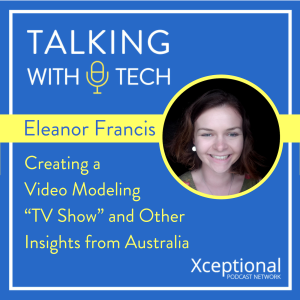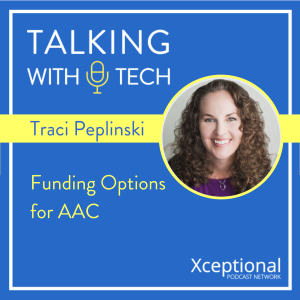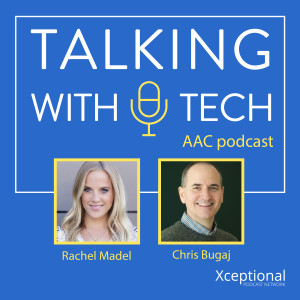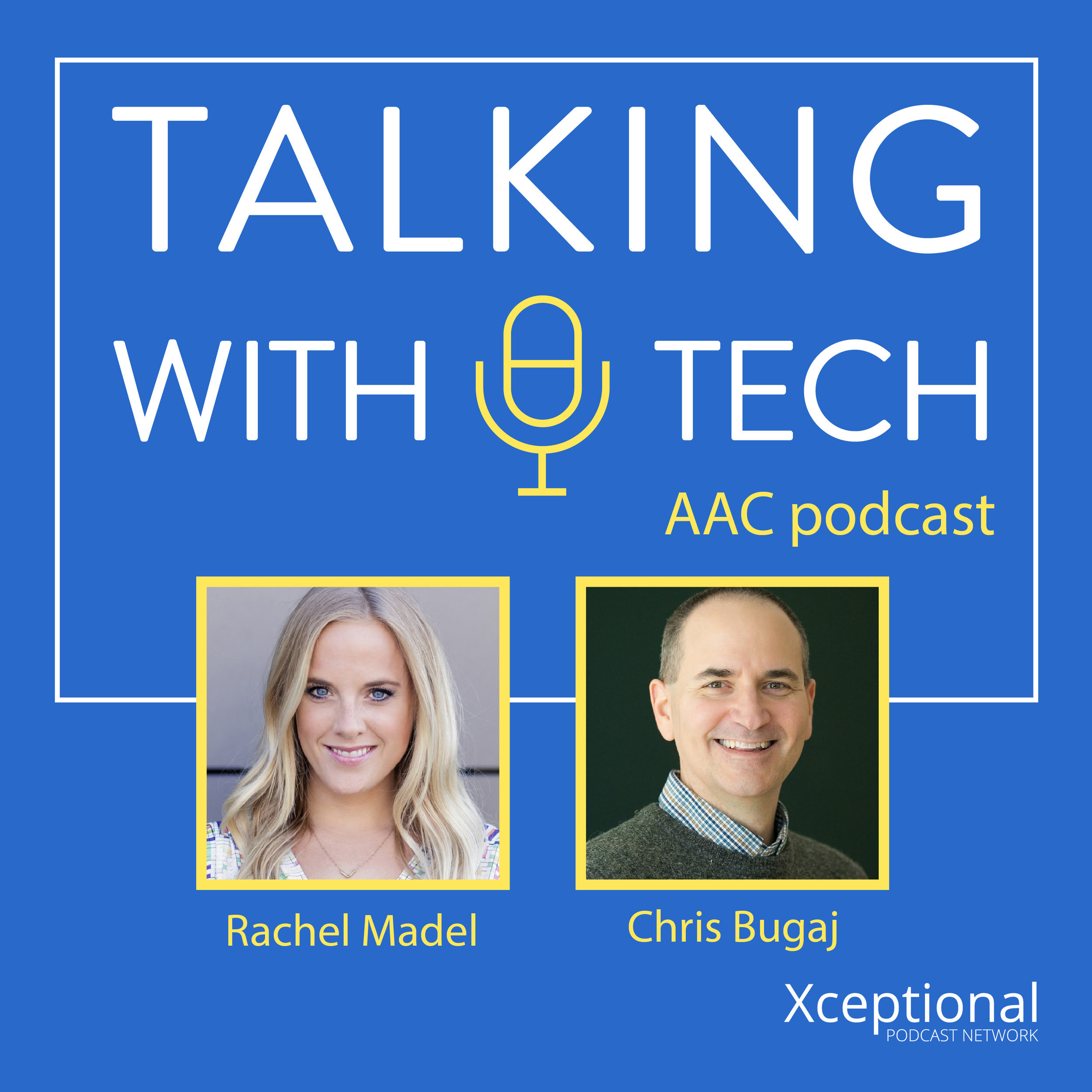Episodes

Tuesday Sep 25, 2018
Tuesday Sep 25, 2018
The Talking with Tech team is joined this week by speech-language pathologist and AAC specialist Eleanor Francis to talk about AAC in Australia, literacy, video modeling, and more! Before the interview, Rachel and Chris mark the beginning of the school year with a discussion of Individualized Education Plan (IEP) meetings. Rachel and Chris chat how they maintain a good relationship with the entire IEP team, how to show the team their views are important, and ways to promote collaboration. Rachel and Chris then briefly touch on wording they try to avoid when writing reports (e.g., do we really know what a student was “able” to do, or just what they did?) and the pros and cons of using video to document client progress.
Following this discussion, Chris interviews Eleanor Francis, a speech pathologist who works with students with complex communication needs at a special developmental school in Melbourne, Australia. Eleanor shares about a number of interesting topics, including her tour of the US visiting AAC experts, recent changes to AAC in Australia, lessons learned from the recent ISAAC 2018 conference, and her experiences helping to create a video modeling "TV show" featuring her school’s staff and students called “MeTV”.
We want to know what you think! Join us on Facebook at Talking with Tech and on Twitter and Instagram (@talkingwithtech). Also, please subscribe and post a review on iTunes - it helps others to find us!

Tuesday Sep 18, 2018
Tuesday Sep 18, 2018
This week, the Talking with Tech team discusses how to obtain funding for alternative and augmentative communication (AAC) devices with speech-language pathologist and nonprofit founder, Traci Peplinski! Before the interview, Lucas, Rachel, and Chris chat about how to find funding for AAC devices and the need for more financial help for individuals who require AAC but cannot pay for it themselves. Then, the team examines why funding for implementation (e.g., training the AAC user’s circle of support) is such an important consideration when evaluating funding needs. The team concludes by touching on some of the challenges they experience with trialing devices during the AAC assessment process.
Following this discussion, Rachel sits down for a conversation with Traci to talk about her nonprofit, A Voice Discovered (www.avoicediscovered.com)! A Voice Discovered provides funding assistance to individuals with complex communication needs in Ventura County, CA. Rachel and Traci discuss why she founded the nonprofit, how it has grown, and how others have used her nonprofit as a model for starting their own! Traci also describes ways that she has helped others find funding assistance, including regional centers, local charities, grants, and donation matching. Finally, Traci discusses her work with The Arc (www.thearc.org) to support adults with complex communication needs, and why helping adults communicate with AAC is so rewarding (and important)!
We want to know what you think! Join us on Facebook at Talking with Tech and on Twitter and Instagram (@talkingwithtech). Also, please subscribe and post a review on iTunes - it helps others to find us!

Tuesday Sep 11, 2018
Tuesday Sep 11, 2018
This week, Talking with Tech is joined by Dr. Jill Senner and Matt Baud! Jill and Matt are AAC experts who promote an evidence-based, systematic method for coaching communication partners how to implement AAC through partner-augmented input (PAI). Before the interview, Rachel and Chris discuss why training and coaching communication partners should be thought of as an ongoing process rather than something that happens once or twice in a “training.” Rachel and Chris also talk about why it is important to try and follow evidence-based principles when coaching communication partners and implementing AAC, even if we may not be able to meet that goal all of the time.
Following this discussion, Rachel and Chris interview Jill and Matt about teaching communication partners to model effectively, how they came to become interested in partner-augmented input, and lessons they have learned coaching communication partners in a systematic way. Their process is based on Kent‐Walsh & McNaughton’s (2005) 8-step process for communication partner instruction, which includes 1) pretest, 2) strategy description, 3) strategy demonstration, 4) SMoRRES (slow rate, model, respect & reflect, repeat, expand, stop), 5) controlled practice & feedback, 6) stepping back, 7) post-testing, and 8) generalization. Jill and Matt explain why generalization can be achieved effectively using this 8-step process, why this process takes less time than you would assume, and strategies for training family members to provide PAI on a consistent basis. Finally, Jill and Matt share some strategies for integrating their 8-step communication partner process into a variety of settings at home and in the community!
Dr. Jill Senner (@JillESenner on Twitter) is a speech-language pathologist, AAC specialist, AAC educator, and owner of the Technology and Language Center! You can find paid and free resources discussing PAI and other topics at her site, talcaac.com!
Matt (@Mbaud12 on Twitter) is an AAC coach, educator, trainer, practice owner, and the AT Coordinator for Niles Township District for Special Education. He is also an adjunct AAC instructor at Saint Xavier University.
We want to know what you think! Join us on Facebook at Talking with Tech and on Twitter and Instagram (@talkingwithtech). Also, please subscribe and post a review on iTunes - it helps others to find us!

Tuesday Sep 04, 2018
Tuesday Sep 04, 2018
Talking with Tech is joined this week by Speech-Language Pathologist, Author, AAC Specialist, and CEO of Communication Circles, Betsy Furler! Before the interview, Rachel and Chris engage in a discussion of several “back to school” topics, including: the importance of presuming that all of our students are competent enough to communicate, using the excitement of a new school year to promote AAC intervention, what to do when teachers and/or staff are more familiar with one app than another, and the idea of teaching 80% core words and 20% fringe words. Following this discussion, Lucas interviews Betsy Furler about her career as a consultant, advocate, author, business owner, and SLP! Betsy shares why she has focused her career on using technology to improve the lives of others, how she manages such a hectic schedule, and why blocking out “focus time” is so critical to her productivity. Then, Betsy discusses her work to bring technology and people with disabilities together through bridgingapps.org. Finally, Betsy shares practical tips learned about running her own practice (communicationcircles.com); her strategy for hiring and retaining great SLPs; and the why letting go of perfectionism is so important.
We want to know what you think! Join us on Facebook at Talking with Tech and on Twitter and Instagram (@talkingwithtech). Also, please subscribe and post a review on iTunes - it helps others to find us!

Tuesday Aug 28, 2018
Tuesday Aug 28, 2018
Talking with Tech is joined this week by Carrie Baughcum, a special education teacher who teaches language and literacy using a form of drawing called “sketchnoting”! Before the interview, Chris and Rachel discuss how to make drawing a language-rich activity, the benefits of child-directed therapy, and ways they incorporate drawing into their own therapy. Next, Chris is joined by Carrie Baughcum to talk about how she uses sketchnoting to improve visualization and teach language. During sketchnoting, Carrie reads a story (or teaches a lesson) while both she and the students draw several pictures about what they are thinking. In the interview, Carrie shares the story of how she and a friend turned sketchnoting into a classroom activity, and why this approach helps her students understand and remember material better. Carrie and Chris also discuss how to teach core words with sketchnoting, ideas for getting everyone to draw - no matter their skill, and more!
You can connect with Carrie on Twitter (@heckawesome) or at her website (carriebaughcum.com)!
We want to know what you think! Join us on Facebook at Talking with Tech and on Twitter and Instagram (@talkingwithtech). Also, please subscribe and post a review on iTunes - it helps others to find us!

Tuesday Aug 21, 2018
Tuesday Aug 21, 2018
This week, Chris interviews Nicole Wingate and Angie Sheets! Nicole is a Speech-Language Pathologist and Angie is an Intensive Intervention Specialist who created a series of online videos teaching high-frequency, versatile vocabulary words (i.e., core vocabulary). Before the interview, Rachel and Chris discuss topics related to using videos in their own practice, including: the difference between using videos for instruction and as a reward, using short animated films to model core vocabulary, why we should pause and re-watch videos with clients, the benefits of turning captions on, and how to use a client’s photos and videos to teach AAC and language. Following this, Chris sits down with Nicole and Angie. They share the story of deciding to make their own videos after finding few other videos about core vocabulary online. Their project has grown into a series of 30+ videos teaching core vocabulary concepts to students, teachers, and parents in a fun and engaging way. Nicole and Angie share a variety of practical tips about teaching core vocabulary, making videos, and the importance of sharing our own creative projects with others.
Nicole and Angie's YouTube channel can be found by searching "Wings Works" on youtube.com.
We want to know what you think! Join us on Facebook at Talking with Tech and on Twitter and Instagram (@talkingwithtech). Also, please subscribe and post a review on iTunes - it helps others to find us!

Tuesday Aug 14, 2018
Tuesday Aug 14, 2018
Rachel and Lucas discuss entrepreneurship and app development with Barbara Fernandes, CEO of SmartyEars, a company that has created over 60 apps for speech, language, and communication! Before the interview, Lucas and Rachel have a lively conversation about their experience starting a private practice, their reasons for doing so, and some of the pitfalls they ran into starting their practice. Following this discussion, Lucas and Rachel sit down with Barbara to talk about her experiences as a business owner, app developer, speech-language pathologist, AAC specialist, and blogger at geekslp.com. Barbara shares insights learned from a multitude of experiences working with bilingual students, founding SmartyEars, developing apps for iPhone and iPad, blogging, and creating her own symbol system, SmartySymbols!
Questions addressed this episode include:
Why did Rachel move to LA and start a practice in a new city?
What experience told Lucas he should be working with AAC?
Why did Rachel start out her practice doing in-home therapy?
What made Lucas and Rachel decide it was time to start their own practice?
What do Rachel and Lucas wish they had known before they started?
What inspired Barbara Fernandes to found SmartyEars?
How can we support better parent/child interactions using technology?
How can we make apps both motivating and instructive?
What inspired Barbara to create her own symbol system?
How can we take our creative and business ideas and make them a reality?
We want to know what you think! Join us on Facebook at Talking with Tech and on Twitter and Instagram (@talkingwithtech). Also, please subscribe and post a review on iTunes - it helps others to find us!

Tuesday Aug 07, 2018
Tuesday Aug 07, 2018
This week, Lucas and Rachel discuss their experiences with screen time and ways that they have tried to make screen time more meaningful for clients. Rachel and Lucas also discuss situations when they have disagreed with a family member about how to proceed with an AAC intervention, and why parent buy-in is so critical. Next, Rachel and Chris discuss screen time recommendations for children under the age of three with Stacey Landberg, a speech-language pathologist who specializes in early intervention and early childhood development. Ms. Landberg discusses why not all “screen time” is the same and shares some great tips on how parents and instructors can make screen time more meaningful and educational!
Questions answered this week include:
How should we deal with a parent who disagrees about goals or first steps in intervention?
How can we use educational apps to teach AAC?
Why is family input and parent education so critical to AAC in particular?
What is the difference between active vs passive screen time, and are these terms misleading?
Should AAC use be considered “screen time” for children under three?
What is the “default mode network”?
How can caregivers turn video watching into a social interaction?
What is the best way for parents to manage screen time for children under three?
We want to know what you think! Join us on Facebook at Talking with Tech and on Twitter and Instagram (@talkingwithtech). Also, please subscribe and post a review on iTunes - it helps others to find us!

Tuesday Jul 24, 2018
Tuesday Jul 24, 2018
Rachel, Lucas, and Chris are joined this week by Dr. Calum Hartley, Professor of Psychology at Lancaster University. Dr. Hartley’s research focuses on why some young children with autism spectrum disorder (ASD) and complex communication needs may have a difficult time learning the meaning of pictures (e.g., icons, drawings, photographs). One reason a child with ASD may understand one picture over another is its “iconicity,” or how closely the picture resembles its referent (i.e., what the picture is intended to look like). Rachel, Lucas, and Chris open the episode by discussing why iconicity is important to AAC and how it influences communication. The team then discusses why teaching children the meaning of pictures is so important, and situations in which they would (and would not) consider replacing icons with photographs on a speech-generating device. Finally, Lucas and Rachel sit down with Dr. Hartley to discuss his research into ASD, iconicity, and symbolic communication. Dr. Harley and the team provide a fascinating look into picture comprehension, why understanding language is closely connected to understanding pictures, and how we can use iconicity to improve our AAC interventions.
Questions answered this episode include: Why do some children understand photographs more easily than drawings? How do children with ASD learn about pictures in unique ways? How can we use iconicity to improve our AAC interventions? How can we support learning the meaning of pictures? What makes core words less iconic than fringe words?
We want to know what you think! Join us on Facebook at Talking with Tech and on Twitter and Instagram (@talkingwithtech). Also, please subscribe and post a review on iTunes - it helps others to find us!
Hartley, C., & Allen, M. L. (2015). Iconicity influences how effectively minimally verbal children with autism and ability-matched typically developing children use pictures as symbols in a search task. Autism, 19(5), 570-579.
Hartley, C., Trainer, A., & Allen, M. L. (2017). Investigating the relationship between language and picture understanding in children with autism spectrum disorder. Autism, 1362361317729613.

Tuesday Jul 17, 2018
Tuesday Jul 17, 2018
In this episode, Rachel, Lucas, and Chris first discuss the work/life balance for SLPs, including the integration of social media into our professional lives and the need for balancing career growth vs. personal time when pursuing work-related interests.
Then, Chris is joined by school-based AAC Specialist Tabi Jones-Wohleber! Tabi is creator of “Model as a MASTER PAL”, a training series that emphasizes the importance of environment and the communication partner’s responsibility to model. Tabi shares about coaching others to be an effective communication partner, the need to create more naturalistic communication opportunities, and why it is important to speak in statements, not just questions, to people who use AAC.
Questions addressed this episode include:
How can we better balance our jobs and side projects with the need to take time for ourselves?
When is (and isn't) social media an important tool for SLPs looking to connect?
How can we better motivate AAC users to engage with communication partners?
How can we better structure lessons to provide communication opportunities all day long?
What do communication partners need to know to model more effectively?
We want to know what you think! Join us on Facebook at Talking with Tech and on Twitter and Instagram (@talkingwithtech). Also, please subscribe and post a review on iTunes - it helps others to find us!

Join AAC experts Rachel Madel and Chris Bugaj as they dive into a weekly discussion about all things AAC (Augmentative and Alternative Communication). Every episode they deliver practical resources, clinical guidelines and relevant research to help clinicians better utilize technology for individuals with complex communication needs.
Episodes include interviews with industry thought-leaders, clinicians, parents, researchers and app developers to keep you on the pulse of the educational technology scene and better support communication through the use of technology.


